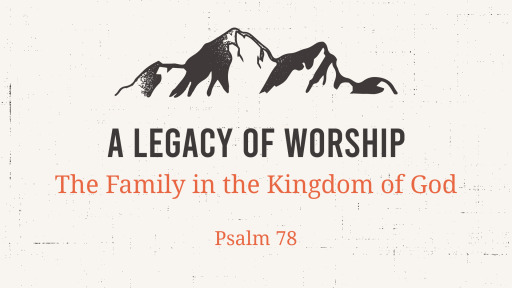Legacy of Worship: The Family in the Kingdom of God

A Call to a Legacy of Worship
The Purpose of Psalm 78
Psalm 78
Psalm 78:1-4
This psalm provides a hermeneutical principle for biblical interpretation. There is a moral order to history as God reveals Himself in judgment and redemption. This is what we must learn and pass on to our children.
We will not conceal them from our posterity, implying, that what we have been taught by our ancestors we should endeavour to transmit to their children. By this means, all pretence of ignorance is removed; for it was the will of God that these things should be published from age to age without interruption; so that being transmitted from father to child in each family, they might reach even the last family of man.
Around the fire-side fathers should repeat not only the Bible records, but the deeds of the martyrs and reformers, and moreover the dealings of the Lord with themselves both in providence and grace. Children should be taught cheerfully by word of mouth by their own mothers and fathers, as well as by the printed pages of what they too often regard as dull, dry task books.
What we can expect throughout the remainder of this psalm is the recitation of these works. Their purpose is clear: the work of God is for the worship of God. Confronted by His acts we are to fall down before Him in adoration and praise.
Psalm 78:5-8
Psalm 78:9-11
Psalm 78:12-20
Psalm 78:21-33
The reason for God’s wrath is Israel’s unbelief. To “believe” is not merely to assent to propositions about God; rather, it is to throw ourselves upon Him, abandoning all other support or hope. More over, in verse 22 Israel “did not trust [‘become secure’] in His salvation [‘deliverance’].”
Psalm 78:34-39
They could not be too zealous; they were in hot haste to prove their loyalty to their divine King. Who would not be pious when the plague is abroad? Even reprobates send for the minister when they lie dying. Thus sinners pay involuntary homage to the power of right and the supremacy of God, but their hypocritical homage is of small value in the sight of the great Judge.
Piety produced by the damps of sorrow and the heats of terror is of mushroom growth; it is rapid in its upspringing—“they inquired early after God”—but it is a mere unsubstantial fungus of unabiding excitement.
Psalm 78:40-55
We suppose that we know what we are saying when we say “God.” We assign to Him the highest place in our world; and in so doing we place Him fundamentally on one line with ourselves and with things…. We assume that we are able to arrange our relation to Him as we arrange our other relationships. We press ourselves into proximity with Him…. We dare to deck ourselves out as His companions, patrons, advisors, and commissioners. We confound time with eternity. This is the ungodliness of our relation to God… Secretly we are ourselves the masters in this relationship. We are not concerned with God, but with our own requirements, to which God must adjust Himself…. And so, when we set God upon the throne of the world, we mean by God ourselves
Psalm 78:56-64
Psalm 78:65-66
Psalm 78:67-72
If Israel’s record is her shame, God’s persistent goodness emerges as her hope (and ours) for the unfinished story.
We are taught that whatever worth there was in the children of Abraham, flowed from the fountain of God’s mercy.
